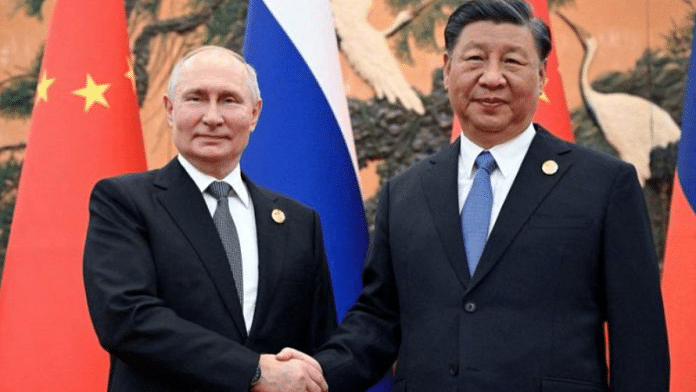In the realm of global geopolitics, every diplomatic move carries significant weight, especially when it involves the leaders of major nations. Russian President Vladimir Putin’s recent visit to China has stirred considerable interest and speculation, particularly regarding its implications for India. As two of the world’s most influential powers, Russia and China forging closer ties undoubtedly has repercussions that extend beyond their immediate bilateral relationship. Putin and Chinese President Xi Jinping have, in recent times, had a number of in-person summit-level meetings apart from numerous online interactions.
The launch of the special military operations by Russia against Ukraine in February 2022 was preceded by a meeting between the two heads of state. Here, the two countries declared a ‘no-limits partnership’ with each other. For India, situated in the middle of this geopolitical turn, the implications are multifaceted and require careful analysis.
The backdrop against which Putin’s visit to China unfolds – a fresh Russian offensive in the Kharkiv region of Ukraine – can help gauge ramifications for India. The Russia-China relationship has undergone a remarkable transformation in recent years, evolving from one characterised by suspicion and competition during the Cold War era to one of strategic partnership in the 21st century. This ‘no limits’ relationship has been driven by various factors, including shared concerns about the United States’ hegemony, economic interests, and a convergence of views on certain international issues.
A worrying camaraderie
One of the declared key areas of cooperation between Russia and China has been in the realm of energy. The two countries have engaged in significant energy deals, including the construction of pipelines and the sale of natural gas, which have strengthened their economic ties. Putin’s visit to China included discussions on further deepening energy cooperation by operationalising the Power of Siberia-2 gas pipeline, which could have implications for India’s energy security. As Russia strengthens its energy partnership with China, India may need to diversify its energy sources to reduce dependence on any single supplier.
Moreover, Putin’s visit may have repercussions for the strategic balance in the Indo-Pacific region, where India and China have competing interests and geopolitical ambitions. The closer alignment between Moscow and Beijing could potentially embolden the latter in its assertive actions in the region – including territorial disputes with India along the Himalayan border. Russia’s tacit support or neutrality in such conflicts could complicate India’s strategic calculus and necessitate a reassessment of its foreign policy priorities. Given a no-limits partnership and the premise that China is undoubtedly supporting the Russian war effort, India can no longer assume Russia’s support in reining-in China in the event of a clash.
Another aspect to consider is the impact of Russia-China cooperation on India’s relations with the US. India has sought to maintain a delicate balance between its traditional partnership with Russia and its burgeoning strategic ties with the US. A closer Russia-China axis may push India further into the arms of the US. New Delhi will, of course, try to counterbalance this growing pressure of the China-Russia partnership. It could manifest in increased defence cooperation between India and the US, as well as closer alignment on regional and global issues. However, one of the most important pillars of India’s foreign policy, strategic autonomy, will be severely tested in the face of deepening Russia-China ties.
Furthermore, Putin’s visit to China underscores the shifting dynamics of the international order. Power is gradually shifting away from Western nations and toward emerging economies in the East. As Russia and China strengthen their partnership, they are likely to challenge the existing global order dominated by Western institutions and norms. This could create opportunities for India to play a more assertive role in shaping the emerging multipolar world order, leveraging its strategic location and growing economic clout. India’s efforts to energise and be the voice of the ‘Global South’ – which received enthusiastic support in the G-20 – is a step in this direction.
Also Read: India can’t ignore Russia-China bonhomie. Pursue CNP with a grand strategy
India must be careful
India must tread cautiously to safeguard its interests. It must realise that closer Russia-China ties also offer opportunities for India to enhance engagement with both countries on issues of mutual interest such as counterterrorism, regional stability, and economic development.
The decades old Russia-India relationship cannot be brushed aside so easily, more so in the context of military cooperation. Over the decades, India has acquired a diverse array of Russian weaponry, including iconic platforms like the Sukhoi Su-30MKI fighter aircraft, T-90 tanks, and the BrahMos supersonic cruise missile. Not to mention the S-400 missile system that was contracted in the face of stiff US opposition and under the shadow of the US’ CAATSA (Countering America’s Adversaries Through Sanctions Act).
Moreover, Russia has been willing to transfer critical defence technology to India, allowing for indigenous production and customisation of certain weapons systems. The Russia-China bonhomie and India’s balancing act between Moscow and Washington only reiterates what the 19th-century British statesman and Prime Minister Lord Palmerston apparently once said: “There are no permanent enemies, and no permanent friends, only permanent interests”.
General Manoj Mukund Naravane PVSM AVSM SM VSM is a retired Indian Army General who served as the 28th Chief of the Army Staff. Views are personal.
(Edited by Zoya Bhatti)



